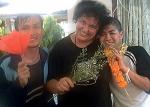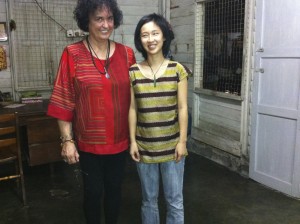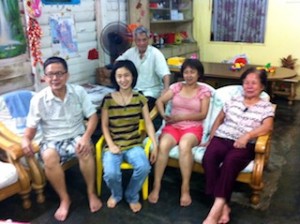Visa Run To Kuala Lumpur
LiYu, my former couchsurfer in Oaxaca last year had been a student at Colby College in Maine on a scholarship and had accompanied Gustavo Esteva, from Oaxaca, and a group of other American students on a one year tour to India, Thailand, New Zealand and finally to Oaxaca to study indigenous sustainability…not to teach…but to learn. At the end of her year with Gustavo she returned to Malaysia to find a way to implement what she had learned.
I fell in love with her in Oaxaca and so I jumped at the chance to join her and her family in their home in Kuala Lumpur for a couple days while renewing my tourist visa.
I had the luck of meeting her grandparents…Chinese immigrants to Malaysia and learned a bit of history.
By the start of the second world war, Malaysia’s economy was flourishing with the output of tin and rubber, giving it great strategic importance. Malaysia fell under threat of a Japanese invasion when the American, British and Dutch governments froze essential raw materials and oil supplies to Japan. Japan was then forced to look to Southeast Asia for shipments. While Britain was preoccupied with defending itself against he threat of German invasion, the Japanese wasted no time to effect their occupation of Malaysia, commencing with the bombing of the beaches of Kota Bharu in Kelantan, and Singapore, on 8 December 1941.
The takeover continued almost without opposition as Commonwealth troops defending Malaysia were expecting invasion by sea and not by land. They were hopelessly and inadequately trained in jungle warfare and lacked ammunition, so fell to the invaders one by one. Malaysia was occupied for the next three and a half years by the Japanese.
On Feb 15th, 1942 Britain surrendered the Allied forces.
Within ten weeks the Japanese won control of Malaysia and Singapore. The dreaded Japanese secret police, the Kempetai subjected sympathisers to humiliation and torture especially the Malaysian Chinese sympathisers who were treated ruthlessly and executed.
Oppression of the Chinese community led to a resistance movement which moved to the jungle fringes. There was widespread unemployment and marked social and economic problems, destruction of mining equipment and decline in rubber and tin industries. An armed resistance movement against the Japanese was organised in the Malaysian jungle consisting mainly of Chinese men from The Malaysian Communist Party.
When the Japanese took control of Malaysia they put the Chinese in a sort of concentration camp…individual homes that were fenced off to contain the population. Very ironic. LiYu’s grandparents were among those and they still live in that original home in a seedy part of KL. Listening to them talk (through LiYu’s mom who translated) I came to realize why the Chinese are often the fiercest conservative bootstrappers. And finally understood why LiYu feels so constrained living at home with her parents who are quite controlling. You have to get out, I said to her. Yes I know, she said.
Tags: Kuala Lumpur, Malaysia




Leave a Reply